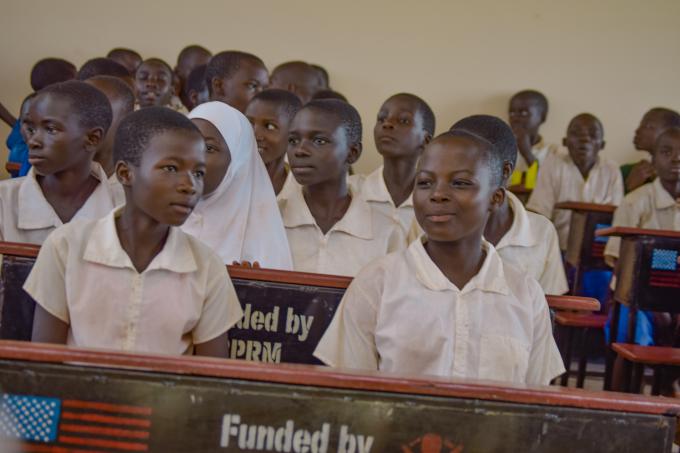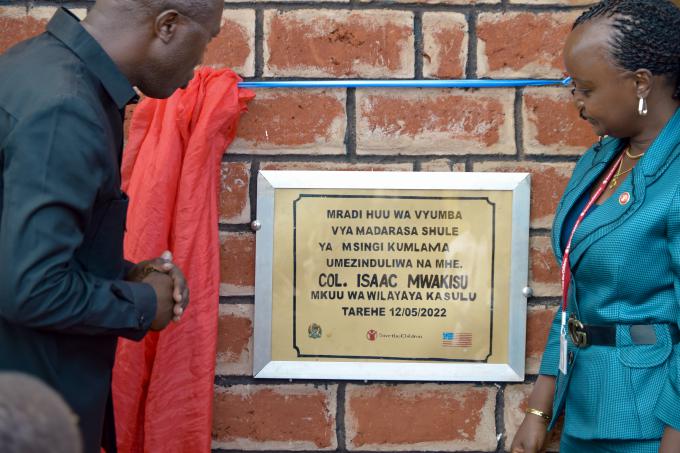Delivering Impacts for Children on Education in Kigoma

Save the Children has been implementing an integrated program covering Child Protection and Education in Emergencies, in Kigoma region, since 2017. SC has been supporting host communities in Kasulu and Kibondo districts by strengthening infrastructure, building capacity and strategic partnerships with state and non-state actors on education and child protection.
In the past five years, Save the Children provided a total of 2,073 desks, both in the refugee camps and in the host communities, enabling 6,219 children to sit comfortably during their learning. These were also provided along with the construction of twelve girls-friendly toilets, 42 classrooms, and six teacher’s offices among other infrastructure. Education statistics have indicated that while there is an increasing number of children enrolled in schools following the Free and Compulsory Basic Education policy, challenges such as inadequate infrastructure, including classrooms, desks, toilets, and teachers’ rooms continue to hinder the provision of quality education to students. For example, the Kigoma region in 2021, had a total of 110, 032 desks (equivalent to 323, 368 seats) against an enrolment of 508,512 pupils making Kigoma one of the regions with the highest Pupil Desk Ratio of 1:5 in the country. The government guideline indicates the acceptable Pupil Desk Ration is 1:3.

During the handover ceremony, which took place in Kasulu and Kibondo in May 2022, the invited guests of honor in both districts commended SC’s efforts in supporting the government policy on Free and Compulsory Basic Education Policy. The guest of honor in the Kibondo region, Hon. Kanali Aggrey Magwaza, the District Commissioner for Kibondo who was represented by the Divisional Secretary commended SC efforts to improve the quality of education and called for citizens to contribute in building infrastructure. He said “Efforts to improve the education sector in Tanzania need to come from every citizen. Non-Governmental organizations like Save the Children have supported part of the initiative, and it is now time for people in this community to also contribute in building needed infrastructures. The handing over of this project will not only help reduce overcrowding in schools, it will also reduce the distance our children walk to and from school every day, and it will keep them safe”
In Kibondo district, Save the Children handed over to the Nyampegere Primary School a total of 60 desks and two classrooms that will benefit 180 children. The decision to construct the classroom was made following the overcrowding in Bitulana Primary School whereby 589 children took turns in using the only available 6 classrooms. The Nyampegere Primary School Headteacher noted that the school is expected to open its doors in September after finalizing the construction of the teacher’s offices and toilets. Currently, the pupils are temporarily accommodated in the nearby school.
In Kasulu, district, Save the Children handed over to Kumlama Primary School a total of 50 desks, one classroom, and one girl-friendly toilet block with three doors, bath space and incinerator. The Kigoma Region Community Development Officer, Mr. Msafiri Nzunuri, who represented the Kasulu District Commissioner thanked Save the Children for its efforts to support the government’s initiative in education. “These efforts by Save the Children proves the commitment this organization has to ensuring that children have access to education. The construction of these infrastructure will help the government focus its resources in other areas needing them the most.”
Kigoma region has a total of 664 primary schools in which 642 are owned by the government. For the year 2021 alone, the region had a total of 508, 512 students who were enrolled in standards I to VII, whereby 96.7% were in public schools. Additionally, Kigoma has a serious shortage of classrooms and currently there are only 5,054 classrooms in the entire region, making the Pupil - Classroom Ratio be 1:99, way above the government-indicated ratio of 1:45. These challenges and many more contribute to overcrowding in classrooms, oftentimes causing truancy, and it has been witnessed in a number of cases where girls dropped out of schools due to lack of latrines and other proper menstrual hygiene facilities.
Save the Children delivered the above project through generous support from the United States Government, State Department, Bureau of Population, Refugees and Migration (PRM) in phase four of the project titled “Protecting and Educating Refugee Children in Kigoma, Tanzania”, in which support to the host communities in Kibondo and Kasulu districts forms a very important aspect of the project.
 Tanzania
Tanzania